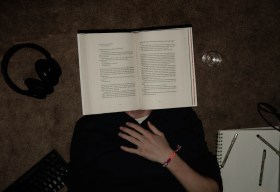Margaret Atwood’s latest offering Stone Mattress: Nine Tales is like a best-of cross-section of her work, featuring a tiny glimpse into what makes this author so unlike any of her peers.
Tales, mind you. Because “we may safely assume that all tales are fiction…”. This distinction, made in the book’s appendix, flags from the very onset – before you have even opened it, really – a regular motif across almost all of Atwood’s work: an open disregard for convention.
There is the fine line, for example, between the conventions of genre and literary works, a case she’s answered to before. Asked why she does not accept the label of science fiction for her dystopic works, she argues that the job of science fiction is to describe what has not happened –“talking squids in outer space”, for example. Her work, which she describes a speculative fiction, is distinct from science fiction as it deals with themes and events which are already present in the world we live in; in the Oryx and Crake trilogy, Atwood describes a bleak end-game future in the aftermath of rampant human consumption, genetic modification, radical economic disparity and diabolical climate conditions. It’s a distinction that has rankled science fiction writers and readers, who have accused her of snobbery.
Atwood’s dystopias do have a cannily possible ring to them, though. The final story in the collection, the adorably titled Torching the Dusties is a dark parable set in the near future, in which residents of an up-market aged care facility face are faced with a disaffected new generation holding them to account to the damage they have done.
Then, too, as if a direct parody of this calling out of genre against literary fiction she offers The Dead Hand Loves You. Complete with signature Atwoodian meta-narrative capers, the story describes in great detail the plot of a tawdry pulpy horror novel, and the author Jack, for whom the subsequent fame, fortune and cult-following is both a blessing and a curse.
Similarly, in Alphinland, the opening story, which links to the proceeding two, Constance has made her fortune writing a series of extremely popular fantasy books, much to the chagrin of her artistic peers and especially poet ex-boyfriend, Gavin. Living dangerously at the edge of reality – between her real life as a widow, her created world in Alphinland, and her ongoing conversations with her deceased husband – Constance’s tenuous relationship with reality is more a highly developed coping mechanism than a psycho-dysfunction.
In the second of these interconnected stories, Gavin is struggling with both mortality and a nasty creative slump, while fielding academic interrogation from an earnest PHd student (who turns out to be interested in the works of Constance). In the third, Marjorie, the woman for whom he jilted Constance, is reconnected into the love triangle and there is a reckoning between the women decades in the making (Gavin and Jack also make for thinly veiled digs by Atwood at the industry of book publicity and academia; the fanfare, analysis and hype completely bamboozling to these comparitively simple fictitious authors).
This last story in the ‘trilogy’ in which Marjorie and Constance finally meet is an example of her other key theme: Atwood is at her best when exploring toxic relationships, like conniving women who destroy men, and selfish men who take advantage of women. But her observations seem to cut closest to the bone when focused on relationships between women and she’s scarily attuned to the quiet menace of the frenemy (think: Cat’s Eye). In this collection, she revisits characters from her 1993 novel The Robber Bride in her story I Dream of Zenia and delivers justicce. A redemptive postscript to the novel, the story takes up with present-day friends Roz, Charis, and Tony and the evil husband-stealing Zenia reincarnated into a cantankerous pet dog.
Fans of her work (who may or may not have been hanging out for a novel length work) will not be disappointed by this collection. Atwood’s genius throughout is to be razor-sharp funny, even while she prepares us, speculatively, with a bleak future.






